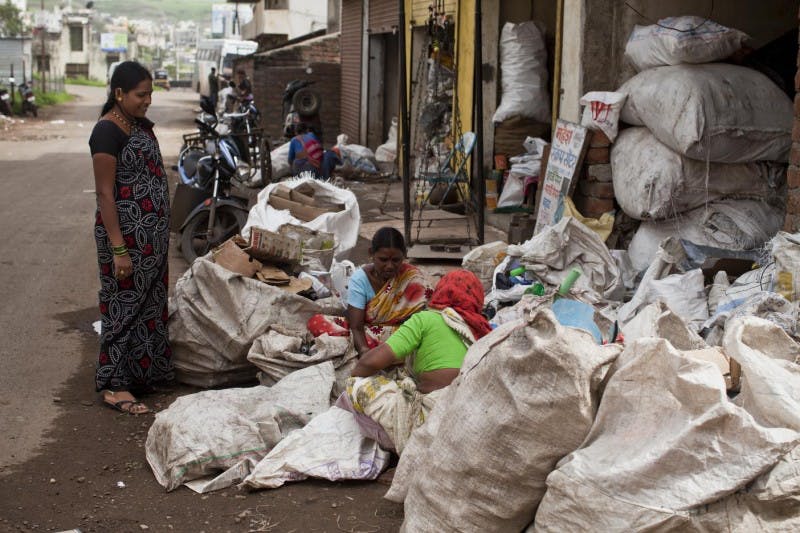Sayali, a waste pickers’ advocate in India and beneficiary of the 3D Program for women and women, illustrates the obstacles that poor people inside the nation should beat to entry well being companies. We should #UniteforHealth as a outcome of we’re solely as sturdy as a outcome of the weakest members of our society.
expert as a biologist, Sayali recently switched careers to do what she thinks is extra significant: serving as an advocate with the waste pickers commerce union. Sayali now helps waste pickers entry authorities well being safety in Pune, India.
Over seventy five% of the waste pickers inside metropolis are poor Dalit women. The waste pickers’ financial, social, and environmental contributions to metropolis are spectacular — they buy over 600 tons of waste every day, ninety tons of which is diverted from landfills and recycled, and as a lot as eight tons is composted day by day. regardless of this, waste pickers and their households are typically dealt with with contempt and are frequently not afforded their rights and entitlements.
Sayali recounts her encounters with a large, private multi-specialty instructing hospital that has over 800 beds. as a outcome of it is operated by a public charitable notion, the private hospital is required to order 10% of its beds for impoverished sufferers and to deal with them freed from value beneath the State Aided Charitable Trusts Hospital Scheme (SACTHS). notion hospitals comparable to this one acquire tax, land, and completely different concessions from the federal authorities. The hospital might even be an official participant inside the metropolis poor well being scheme for slum dwellers, by which hospitalization prices are chop up equally between the affected person and the Pune Municipal company. The hospital additionally participates inside the state-funded, insurance coverage-based mostly plan that gives free remedy to poor sufferers who require costly procedures and intensive care remedy.
nonetheless, the hospital does not always adjust to current these companies. Sayali remembers when Devaki, a waste picker, recognized as to say her daughter-in-legal guidelines Janaki had fallen off a bus, hit her head and vomited. She was inside the emergency room with a saline drip and little else. The hospital refused admission till she paid a deposit of 10,000 rupees (US$one hundred thirty five), which she didn’t have. What she did have was a ration card stamped under Poverty Line that entitled her to medical care beneath three authorities purposes. She lay there till Sayali reached the hospital. The billing administrator requested Devaki to pay 4,000 rupees for a CT scan and mentioned if she wished an operation, he would admit her beneath a state-funded insurance coverage
“Her card had expired, however I insisted that she licensed for SACTHS,” mentioned Sayali. “He claimed the hospital had exhausted its Indigent sufferers Fund. I requested him to place that declare in writing.”
in the meantime, the doctor continued to refuse to see Janaki and insisted it was not a notion hospital. Sayali, for her half, continued advocating to get Janaki care, placing a quantity of calls to officers on the Charity Commissioner’s office. A staffer from the office recognized as the hospital, and Janaki was lastly admitted and given the mandatory remedy she wished.
one other event Sayali recalled was when Deepak, a waste picker with blood strain factors, felt unwell and was taken to the identical hospital by his spouse, Kamini. whereas there, he had a stroke and collapsed. When he couldn’t pay the deposit of 30,000 rupees, the hospital recognized as the general public emergency medical companies line and despatched him to the federal authorities hospital. all of the tactic took a pair of hours — a vital interval to be with out remedy. Deepak, who was solely forty five years previous, died, and now Kamini is left alone to convey up their youthful youngsters.
sadly, Sayali says associated experiences with completely different charitable notion hospitals are all too widespread. regardless of being formally registered to current companies to low-income sufferers as an ingredient of the federal authorities schemes, numerous the hospitals nonetheless refuse to deal with waste pickers or completely different poor sufferers. typically care is provided solely after a poor affected person’s employers, municipal counselors, or native social staff intervene.
Sayali urges, “We should insist that notion hospitals should implement the scheme persistently, and be held accountable for his or her actions. The free remedy that they are anticipated to current to indigent sufferers is in spite of the whole lot in commerce for the concessions that they get from the federal authorities.”
Sayali’s report of the expertise of waste pickers displays how poor people comparable to Deepak and Janaki are topic to at least one in all many worst types of discrimination in India. the options hospital workers make — to admit sufferers, to insist on a deposit earlier than remedy, to current remedy — could make the distinction between gifting life or condemning a affected person to demise. It’s clear the regulatory our bodies of the state should uncover a approach to make sure that that charitable hospitals fulfill their obligations. in any other case the federal authorities and the hospitals are betraying a sacred notion and limiting entry to lifesaving care.
we’re all safer and stronger as quickly as we #UniteforHealth. assist the UN basis’s work to ship well being for all.
due to the 3D Program for contributing this story.
Featured photograph: 3D Program for women and women

